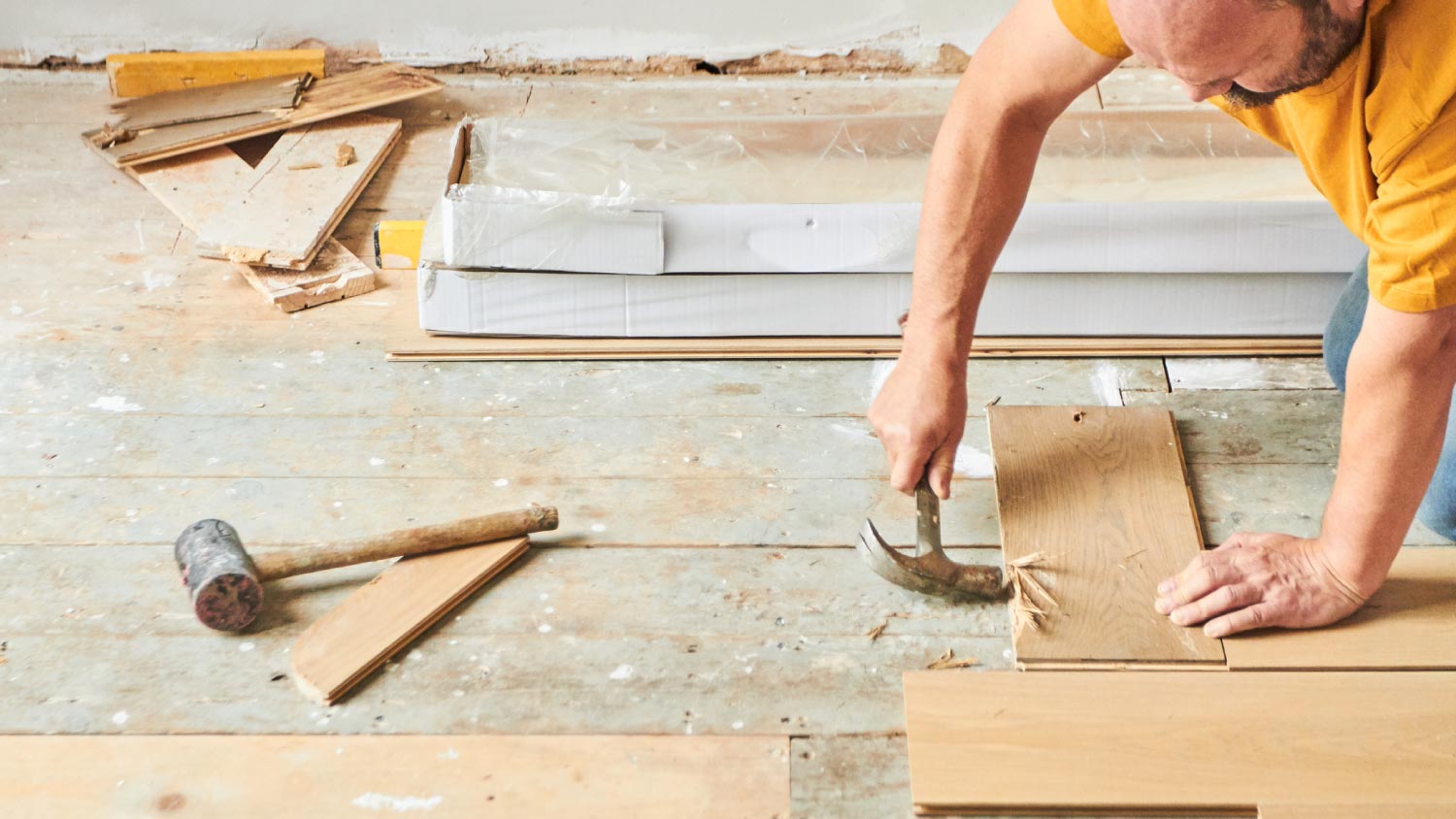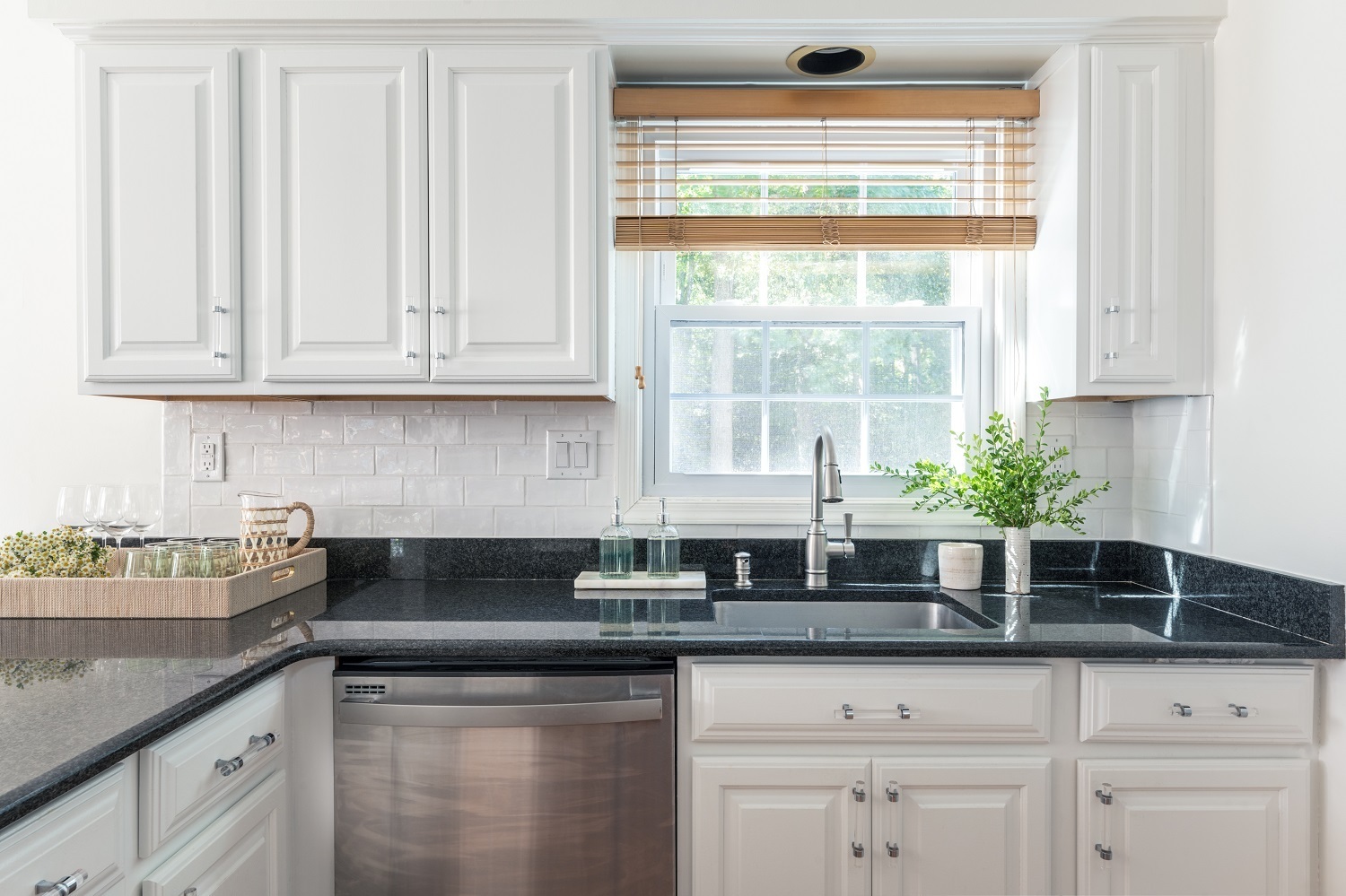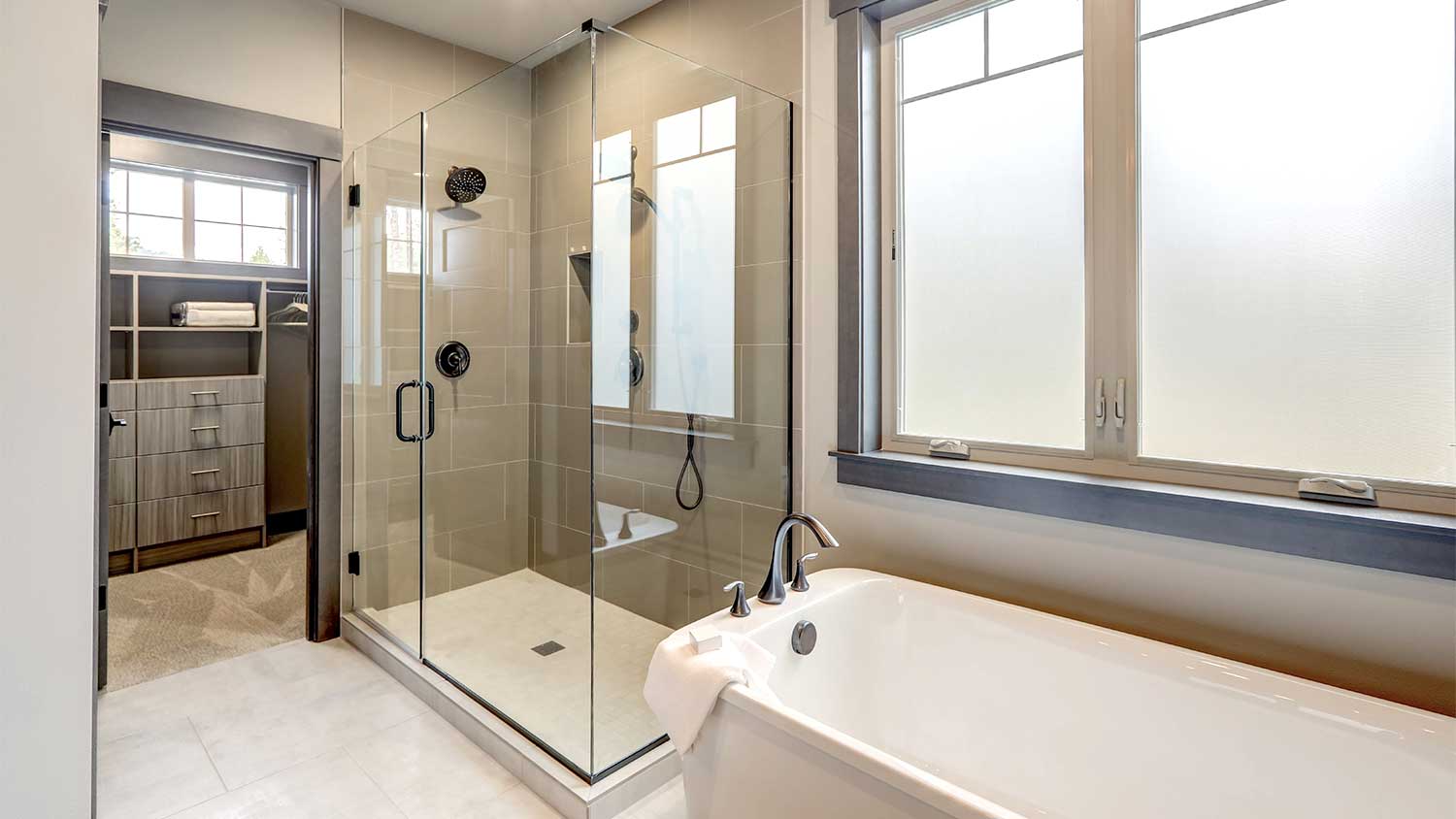How Long Does It Take to Renovate a House?
Whether you renovate or remodel, here’s how long it will take


Renovation or remodel projects can take a few days to over a year.
Cosmetic upgrades can take three days to three months.
Major changes like adding a second story can take up to 15 months.
Even with the best-laid plans, renovation timing can be unpredictable.
If you’ve ever watched a home renovation show, you’ll know the biggest challenge is keeping the project on time and within budget. But just how long does it take to renovate a house? Home renovation timelines can range from as little as a few days for simple cosmetic projects to over a year for projects that include the entire home.
While it’ll never be an exact science, and every project is unique, it’s possible to work out roughly how long it takes to renovate a house. All it takes is some levelheaded planning and preparation and hiring the right contractors.
Home Renovation Timeline by Type of Renovation

Whether you’re putting in a new backsplash or renovating a bedroom, you’re probably eager for the outcome and less enthused about the process.
But painting a couple of rooms in your house might only take a few days with minimal planning, whereas a whole house remodel could take well over a year and be subject to delays.
Evaluating the size of your project and whether it’s one you plan to tackle yourself is the first step to understanding how long your home renovation venture will take. Here’s a look at how long it will take to renovate a house, based on the size and complexity of the project.
| Renovation Size | Time | Example Projects |
|---|---|---|
| Simple or cosmetic | 3 days–3 months | Upgraded flooring, painting, new cabinets, new deck |
| Medium | 3 weeks–6 months | Total remodel, room addition, basement finishing, new electrical |
| Major | 12–15 months | Second story addition, structural repairs, flooding, floor plan changes |
Cosmetic Home Renovations
Timescale: 3 days–3 months
Example projects:
Flooring replacement
Exterior or interior painting
Replacing a bathroom suite without changing position
Adding a deck
These basic makeovers don’t involve structural work or major overhauls. Often, pros will complete them within a week. If you’re a DIY weekend warrior, it might take you a month or two to paint the entire house exterior.
Medium Home Renovations
Timescale: 3 weeks–6 months
Example projects:
Adding a room
Finishing an attic or basement
Roof replacement
Full home rewiring
More significant tear-out and replace work is often on the cards here. You'll have to get your planning hat on and rely on more professional help than with basic cosmetic renovations.
If you’re a DIY whiz, you might tackle most of the work for some projects and just call in a licensed electrician near you or a plumber to finish things off. But by the time you add in design support and possible permit applications, this extends your overall timeline. Keep in mind that a kitchen remodel timeline usually takes six weeks to four months.
During a home renovation, you may need a place to stay for a few weeks or months. First, ask friends or family if they can host you during the project's duration. If that's not an option, you can look into renting a small furnished home or apartment with a short-term or month-to-month lease. Vacation rental sites may also offer a good value if you book for an extended stay—especially if it's off-season. Remember: furnishings and flexibility are key.
Major Home Renovation or Remodel
Timescale: 12–15 months
Example projects:
Adding a second story
Water or fire damage repair
Major house floor plan changes
Gut job
Whether you're restoring a historic home or undertaking a whole house remodel, major structural work like stripping back to the studs or fixing foundations isn't uncommon.
There’s a lot of planning and prep work that goes into these types of projects. From the tricky task of obtaining permits to working with architects and designers to draw up new constriction documents.
Inevitably, these projects are the ones most subject to frustrating delays. It always pays to plan for the worst and hope for the best when setting timescales to avoid disappointment.
Stages of Home Renovation Projects

You’ll be juggling lots of balls in the air at once for major renovation projects. Breaking down the key stages and using a home renovation checklist gives you a clearer idea of how long it will take to renovate a house and helps prevent costly delays.
1. Discovery
This is the point where you’ll be scouting out the best architects and home remodeling contractors near you. It may take less than a week to find the right pro for the job if you’re just doing a simple cosmetic project. But for a whole-home renovation, you should dedicate a month or two to finding the perfect contractor.
2. Design
Designing a small closet renovation or other simple project will only take two to four days. On the other hand, a large project involving multiple rooms and upgrades could take as long as four months to design. In that case, be ready to attend plenty of meetings about plan revisions, surveys, and more.
At this stage, you’ll be narrowing the scope and finalizing the budget for the project, so it pays to pause for a bit. Changing the plans further down the line is likely to cost money, stress, and time.
3. Prep
The preparation phase involves contractors securing permits, ordering materials, and booking subcontractors. You may be at the mercy of the local authority and its permit approvals and inspection processes. Small or average renovations will still take several weeks for prep, as processing time still applies. But prep for large projects can take up to two months.
If you need to apply for a construction loan, you might have to add another month or two onto this stage. The creditors might not approve the finances until there is permit approval, which can greatly affect how long it takes to renovate a house.
4. Construction
Now the hard work begins. Timelines vary greatly depending on the project scope and whether there are hold-ups. However, cosmetic renovations won’t take nearly as long as larger-scope revamps. Expect small renovations, like upgrading your flooring, to take two to four days for the construction phase. If you’re renovating your entire house, construction could take four months or even as long as a year. It all depends on the scope of the work.
5. Cleanup
Cleanup for small-scale renovations, like upgrading a single room, will take four to eight hours of work. That includes removing scrap materials, vacuuming, and detailing. For larger projects, cleanup often involves filling transportable dumpsters. That typically takes at least one day but could take several days.
Factors That Influence Home Renovation Timelines
Even with the best-laid plans and professionals, you can’t control everything. Be aware of some things that can slow down your renovation schedule.
Bad Weather
Depending on the project, rain, snow, and inclement weather can impact a renovation timeline. Some home improvement projects, like installing a new roof, can’t happen during rain due to the risk of water damage and the safety of the professionals installing it. Other projects, like painting or staining, need to wait up to 24 hours or longer after rain in order to ensure a completely dry surface.
Hidden Problems
Tearing down walls and floors during a remodel means uncovering hidden surprises. It’s common during bathroom and kitchen renovations to find mold or water damage. If discovered, don’t ignore the issue. You may be tempted to save time and money by covering it with new drywall, but it can infect more parts of your house if left untreated, forcing you to rip out all your changes and start over again.
Budget Constraints
A good home renovation tip is to set aside 10% to 20% of your total costs for unexpected issues. This can include new repairs, a sudden increase in the cost of materials, construction management fees, or your overall vision changing midway through the project.
Supply Chain Delays
The national supply chain for building materials impacts any construction project. Any delays in materials would likely lengthen your project timeline. This is especially true for niche materials that aren't as readily available as standard materials.
Personal Challenges
Life does not take a backseat to a home renovation. For projects that span months (or years), illness, vacations, burnout, or other family issues could stall a project. This goes for your pro as well. While it’s rare for these obstacles to stop a project, it doesn’t hurt to ask about a secondary point of contact should projects run into any struggles.
Tips to Keep Your Remodeling Project on Track
There’s always an element of unpredictability about whole house renovation project timelines, but planning and pragmatism go a long way to achieving a tight schedule.
Consider the following when figuring out how long it will take to renovate your house:
Hire the right contractor and involve them in the design phase.
Keep decent wiggle room in your budget. A complete home renovation costs up to $75,000, and invariably ends up being more than you plan for.
Arrange regular progress meetings with your contractor to keep the project on track.
Be realistic about your DIY skills and don’t take on too much yourself.
Frequently Asked Questions
Kitchens tend to be the most difficult rooms to renovate given their high amount of use and electrical and plumbing needs. Kitchen renovations can impact almost every part of a room, including cabinets, countertops, floors, walls, and appliances. It’s also at risk for hidden surprises, like mold or water damage, given it’s exposure to water and steam. This all can result in more time, money, and expertise needed to renovate.
The best time of year to remodel a home depends on the exact type of work you’re doing. For example, spring and summer are ideal for replacing windows, doors, and other features that come in contact with the outdoors. The warmer months have more pleasant weather and, therefore, better conditions for construction.
However, many homeowners enjoy savings by booking their remodeling project in the winter off-season. The best types of jobs for the winter include interior renovations, such as kitchen and bathroom upgrades.
A renovation refers to improving, refreshing, or restoring an existing home. A remodel refers to changing the overall design, layout, and function of a home. There isn’t a need to worry about using renovate versus remodel when speaking with your pro—many people use these terms interchangeably.





- Bathroom Remodeling
- Kitchen Remodeling
- Shower Installation
- Stair Installers
- Bathtub Installation
- Shower Door Installers
- Kitchen Design
- Bathroom Design Companies
- Storm Shelter Builders
- Pre-Made Cabinets
- Kitchen Refacing
- Bathtub Replacement
- Ceiling Tile Installation
- Suspended Ceiling Companies
- Residential Designers
- Stair Builders
- Remodel Designers
- Shower Enclosures
- Home Renovations
- Kitchen Renovations
- Garage Remodeling
- Grab Bar Installation
- Walk-In Tub Installers
- Tub to Shower Conversion
- Balcony Contractors
- 9 Things That Will Slow Down Your Home Renovation
- Remodel vs. Renovation: Pros, Cons, and Costs
- How Long Does a Kitchen Remodel Take?
- How to Renovate a House: A Guide for Homeowners
- 14 Home Renovation Tips for a Stress-Free Project
- How Long Does It Take to Build a House From Start to Finish?
- How Long Does It Take to Renovate a Bedroom?
- How Long Does a Bathroom Remodel Take?
- What Is the Best Time of Year to Remodel Your Home?
- Which Home Projects To Put On Your To-Do List First After Moving











